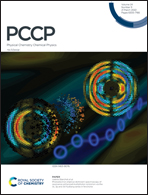Defect governed zinc-rich columnar AZO thin film and contact interface for enhanced performance of thermocouples
Abstract
The research on the stable thermoelectric properties and contact interface of high-precision thin-film thermocouples lags far behind the demand. In this study, a zinc-rich Al-doped ZnO (AZO) thin film was fabricated, in which the carriers were mainly donated by the Al dopant, and the oxygen defects migrated together, forming cage defects. Then, an indium tin oxide (ITO)/AZO thin-film thermocouple was prepared. It had a special temperature-dependent voltage curve due to the effects of cage defects on the thermoelectric properties of the AZO thin film and interfacial electron diffusion. When the zinc atoms in the cage defects were excited after annealing, a linear relationship between the temperature and voltage was obtained. The Seebeck coefficient of the thermocouple was constant at 168 μV K−1 over the entire measured temperature range. In addition, the calculated error of the thermocouple was lower than 1% from 50 °C to 500 °C, showing good repeatability. These results showed that defect engineering could effectively be used to improve the temperature range stability of thermoelectric materials and optimize the precision of thin-film thermocouples.



 Please wait while we load your content...
Please wait while we load your content...